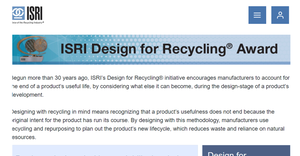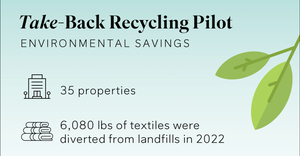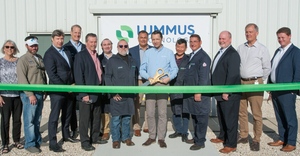Zzyzx has already created a few unconventional test products, for instance frisbees made from coffee pods and plastic.
One of most daunting tasks for MRFs is dealing with blended plastics and with plastics that become contaminated when they mix with other waste. These dirty and blended materials not only are rendered worthless, but ratchet up recyclers’ costs when they have to pay to landfill them.
But an Allenton, Pa., startup, Zzyx Polymers, is deliberately mixing all kinds of waste with plastic as it develops a technology aimed at producing new kinds of recycled plastic. So far the team has done small scale proof of concept trials to show some manufacturers that they can obtain the desired material properties. Zzyzx is starting with plastic films because MRFs receive a lot of this material and it’s tough to recycle.
A key to preserving plastics’ strength is in blending them before they are melted and forming the pellets afterward.
“By blending at room temperature we get things to intimately mix and preserve strength,” says Mike Janse, Zzyzx Polymers CEO.
“We can incorporate challenging materials like PE and PP, which normally don’t blend. Through our process it works, and we end up with good plastic.”
Zzyzx has already created a few unconventional test products, for instance frisbees made from coffee pods and plastic.
But Zzyx is scaling up with a grant from Closed Loop Fund and a National Science Foundation grant to further develop the technology with plans to commercialize it.
Through its proprietary process, called Solid State Shear Pulverization, the company “compatibilizes” materials that would otherwise harm plastic’s strength. Compatibilization is the addition of a substance to a blend of polymers that will increase their stability.
Zzyx achieves this by blending different plastics. The process also allows the firm to toss in cardboard, rice husk and food and label residues.
The Closed Loop Fund believes that the young company is onto something.
"One of the greatest challenges in plastic recycling is making high-value pellets out of food-contaminated or mixed plastics. Zzyzx has developed a cost-effective, low-energy process to do just that,” says Closed Loop Fund Managing Director Rob Kaplan. “We hope this will open the door, making more packaging recyclable and spur additional innovation in this space,"
Zzyzx zeroes in on ocean plastics
“The view is you just scoop it up and send it to a recycler. But much of this plastic is degraded from sun and water,” Janse says. “We can blend ocean plastics with other plastics to make it stronger. We took PP from the ocean and turned it into a pellet. It meets many manufacturers’ specs that we have learned of through MRFs,” says Janse.
Most of the sustainability professionals he has talked to are focused on the question, can this material be recycled?
“Let’s not start with, can it be recycled? We know we can do it,” Janse says. “What we are doing now is trying to identify the end product they will buy and use as a company.”
For now, Zzyzx focuses on what manufacturers use in their operations rather than what they create and sell. Brands worry about the consequences of changing product formulas. So the startup is proposing creating products like shipping pallets, crates and trash cans made for companies from their own waste.
These non-food grade products have less demanding specs and aesthetics are not as important. So while manufacturers may be hesitant to start with, they can get comfortable with this approach. The risk profile works for manufacturers, and the timeline works for Zzyzx.
“As a startup company we can’t hang with someone for three or four years to test the material. This will speed up the process,” says Janse.
As the team moves along, it consults with converters and MRFs to learn of manufacturers’ specifications to be able to produce marketable products that meet their needs.
While Zzyzx is currently focused on ways to use manufactures’ waste, and plans to scale up using this model, the company hopes to eventually capitalize on postconsumer plastics.
“That will increase the amount of recyclable material coming out of MRFs,” says Janse. “We can make progress toward the goal of closing the loop. And we will be helping the environment.”
About the Author(s)
You May Also Like




